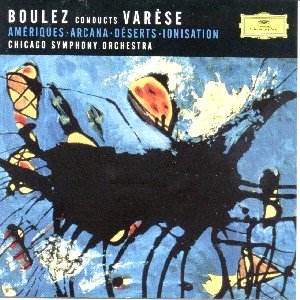Edgar VARÈSE
(1883-1965)
Boulez Conducts Varèse:
Amériques (1921), Arcana (1925-27), Ionisation (1929-31),
Déserts
(1949-54)
 Chicago Symphony Orchestra/Pierre
Boulez
Chicago Symphony Orchestra/Pierre
Boulez
Recorded in Orchestra Hall, Chicago on 12/1995 (Amériques/Ionisation)
and 12/1996
(Arcana/Déserts)
 DG 471 137-2 [68.22],
Full
price
DG 471 137-2 [68.22],
Full
price
Crotchet AmazonUK
AmazonUS
Amazon
recommendations

Pierre Boulez has had a long association with Varèse's music so it
is not surprising that this new disc should be as compelling as it is. Described
by Boulez as an 'outsider' and a 'loner' (and even more memorably as a 'skeleton
from a junk shop'), Varèse's music empties concert halls less now
than it once did. Rightly so, for his music has genuine greatness - a sense
of pulse and rhythm few modern composers after Varèse have really
equalled. Except for Déserts, all of the works on this disc
come from Varèse's '20s period - a time of extreme dissonance in his
scoring and graphic musical imagery (such as the skyscraper allusions in
Amériques with the echo of whistles and sirens).
Desérts, Varèse's reflection on the new, uses electronic
techniques (not, it has to be admitted, with the seamlessness that was to
later become the norm) - the tape interpolated into a composition for wind,
percussion and piano. Boulez, who gave the work its premiere in Paris in
1954, is masterly at variegating the colours of the score, the timbres of
woodwind against percussion (long dissonant lines versus the symbiotic pattering
and snaring of the percussion) as well sustained as it can be. The performance
does have ferocity - but also enormous clarity. The sense of open and confined
spaces being part of the musical landscape are second nature to Boulez and
the virtuoso Chicago players.
Clarity is the keyword when describing the remaining performances on this
disc. Ionisation is almost primeval in its percussiveness - wedges
of melody heard but disseminated. There is the hint of a march, the energy
of a bubbling cauldron about to erupt and the intricate rhythms that criss-cross
like the tracks of a railway junction. Arcana, with its palpable sense
of people and traffic inter-relating, has enormous physicality in Boulez's
hands. The large orchestra is manipulated this way and that with thrilling
immediacy. Amériques is given a blazing performance - particularly
in the use of brass (although this is the reduced score, not the original
one for 29 instruments). As a picture of Manhattan it is both aggressive
and static - a picture as raw in the blocks of sound it conveys as the
streamlined steeliness of the skyscrapers the sound mimics.
As always with Boulez there is sometimes a sense that spontaneity is sidelined
and all of these performances are precise to the point of angularity. If
Chailly gets a warmer, perhaps more claustrophobic sense of spatial
descriptiveness Boulez tends to strip the music to minimalist clusters of
density - more sparse, more knife-edge in its violence. I would not be happy
without either view so cannot recommend one set over the other. Chailly has,
of course, recorded the complete works in magnificent performances - but
Boulez's single disc is self-recommending. Fortunately, both conductors have
great orchestras who play this music as if it is second nature. And both
recordings are exemplary.
Marc Bridle

